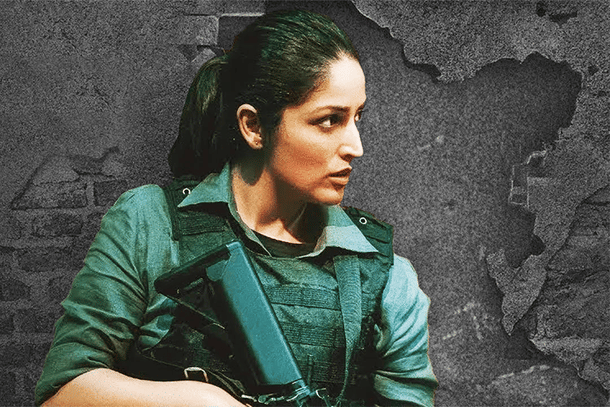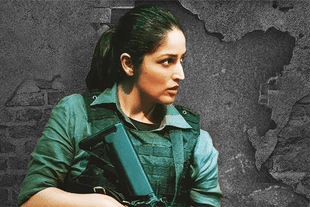Movies
'Article 370' Snatches The Stone Away From The Pelters, And Hits Many Birds With It
Sharan Setty
Feb 24, 2024, 10:41 AM | Updated 10:45 AM IST
Save & read from anywhere!
Bookmark stories for easy access on any device or the Swarajya app.


Indian filmmakers, for a long time, could not convince the country that they were capable of making a decent action film.
In 2019, when I watched Uri: The Surgical Strike, the ambience inside the movie hall was indescribable. There were chants of Bharat Mata Ki Jai when Kirti Kulhari turned around the chopper and started giving cover fire to the Indian soldiers across the Line of Control.
That is when I knew Aditya Dhar had arrived. It was a very convincing story. It may seem a long time ago, but it has not been more than five years since the movie came out. At the time, the scepticism of the media regarding the actual event of India carrying out a surgical strike across Pakistan-occupied Kashmir (PoK) was still there.
The movie explained the impact and importance of the Indian Army's surgical strike across the Line of Control. It was convincing. That is the power of storytelling.
Imagine all that and more with Article 370. The Yami Gautam, Priya Mani starrer has action in it but is mostly a political thriller that explains what went behind the scenes before Article 370 was abrogated by the Indian parliament.
Reasons why you should watch the movie —
One, effective direction, storyboarding has maintained the curiosity throughout the movie. The movie is 158 minutes long, but there was not a single scene which was dragged on for too long or dramatized. Of course, the filmmakers use their creative liberty to convey the importance of certain scenes.
For instance, when a team is set up to review the Constitutional legality and possibility of Article 370's abrogation, the National Investigation Agency team goes to the Kashmir assembly's archives and tries to look for a lost document. This may or may not have been the case, but when dealing with political drama and minimal action scenes, dramatization does help in keeping the audience engaged.
Two, the writers have done their homework from explaining the backstory of how Prime Minister Jawaharlal Nehru tried to patronise his friend Sheikh Abdullah to how certain provisions were cunningly put in place to ensure separation of powers between the state and the union to how New Delhi could not do anything, even if it wanted to. It uses good motion graphics to take the audience through complex history, and legality using an explainer format.
They explain how the conflict economy had been funding the whole Gupkar family business of employing part-time stone pelters and using children as shields in Kashmir. It shows the actions of the Indian Army as intelligent, yet humane.
Three, Yami Gautam and Priya Mani steal the show. This treatment and casting are also intelligent. The presence of many women in the movie, including Yami Gautam, softens the hard approach the government and the military have taken on Kashmir, yet does not make India seem like an ‘elder brother’ who controls the valley’s fate. Kudos to the writers for it.
Four, good acting, overall. Yami and Priya Mani as NIA and PMO officers have played a mature, convincing role as the characters need to be treated with dignity. Arun Govil, playing Narendra Modi, has also delivered the impact one would expect from his character. Kiran Karmakar who plays Union Home Minister Amit Shah hits the ball out of the park with his dialogue delivery, cheeky comedy.
Karmakar received the most cheers from the audience, especially during his speech in the parliament when he said 'jaan dedenge Kashmir ke liye'. The roles played by leaders from the opposition also seem befitting — literally disruptive, comical and confused.
Five, the crux of the movie is about the heroics of the Indian security forces, including the Indian Army and the CRPF. The National Investigation Agency's (NIA) role has been duly credited.
The movie also gives due credit to the security provided in the valley on the fifth of August, 2019, when the Indian parliament took the decision. It also shows how the international repercussions were carefully handled by Indian diplomats. The cooperation of the leaders of the opposition, and how the PMO was intelligent in feeding the media with stories to deflect them gives a rather realistic portrayal of the power circle in New Delhi.
Six, this is good teamwork. From editing, action scenes, direction, dialogues, background score and delivery, almost everything has been rehearsed well and prepared for. Although this is a political thriller and not an action movie, it is a gripping narration of what the nation went through for so many years. Everyone knew what happened, but it was a tell-all tale of sorts for them.
This has been achieved even though there are barely any songs and the background score is not too overpowering like it was in Uri: The Surgical Strike.
Seven, when you see the usual sour faces writing about how this is a 'thinly veiled propaganda' movie, 'yet better than Kashmir Files and Kerala Story', it piqued my interest in it further.
These movies have embittered a section of the media because they make the latter look foolish. After all, even Bollywood movies have done more homework than what some journalists ought to do.
Lastly, this movie will do to Modi what LOC Kargil could not do to Vajpayee. It puts things in perspective, as often people tend to have a very short memory of what happened. It explains the significance of such a political move, and why it was done in a good direction.
Go watch the movie. Let the usual naysayers do their thing.
Sharan Setty (Sharan K A) is an Associate Editor at Swarajya. He tweets at @sharansetty2.




